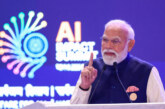
Dr. Arvind Kumar*

Air pollution harms our health, economies and the planet and is a global scale problem and one of the biggest contributors to climate change. The Climate crisis gets attention whenever people experience extreme weather conditions or face natural calamities. This year, the scorching heat in Europe with rivers drying up, wildfires and flash floods in South Asia have brought more global discourse.
South Asia is home to some of the world’s countries most vulnerable to climate change. It is also at the epicenter of ambient air pollution—pollution people are exposed to outside their households. According to the latest World Air Quality Report, 2021, of the top 40 most polluted cities in the world, 37 are in South Asia. Air pollution in the region is a health hazard and represents the third-highest risk for premature death, as compared to the ninth highest cause in Western Europe. South Asian governments are beginning to realize the benefits of resilience; but to become climate resilient, the region needs to adopt ambitious policies and strengthen planning.

Air pollutants and greenhouse gases are often emitted from the same sources, such as coal-fired power plants and diesel-fueled vehicles. Fine particles are the most damaging air pollutants to health responsible for more than 90% of the approximately 7 million premature deaths per year caused by air pollution. Methane is a precursor of ground-level ozone and is 80 times more potent at warming the planet than carbon dioxide over a 20-year period. Furthermore, some components of fine particles, such as black carbon, are also powerful short-lived climate pollutants. Reducing fine particles therefore helps to achieve local benefits of improving air quality and health, and global benefits of climate change mitigation.
In 2019 alone, India experienced an estimated 1.2 million air pollution-related premature deaths as India’s average particulate matter concentration was 70.3 µg/ m3 – the highest in the world and 7 times the WHO’s guideline of 10 µg/m3. The AQLI by the Energy Policy Institute at the University of Chicago shows that air pollution shortens average Indian life expectancy by 5.9 years, relative to what it would be if the World Health Organization (WHO) guideline was met. At the same time, India’s growing economy is driving CO2 emissions, which increased by more than 55% in the last decade, and are expected to rise by 50% to 2040. Today’s energy choices matter for future development, as they have direct and far-reaching implications for the lives of a growing population. Energy-related air pollutants and CO2 emissions often arise from the same sources, therefore the adoption of an integrated approach to tackle both can deliver important co-benefits.
Although by tackling air pollution, governments can accelerate climate change mitigation and reap huge health benefits: but to no avail as air pollution is still treated as a separate issue by most governments and largely ignore their climate negotiations, to the detriment of public health, climate and inequality; even The Climate Vulnerable Forum, whose representatives constitute nations from the Global South, have not been able to push the perpetrators to take corrective action.

There is an urgent need to make action on air pollution an explicit priority in climate change. They must recognize that air pollution and climate change know no boundaries; they must endorse a call to stop all new public investments into fossil fuels; developed nations must ramp up funding commitments to support green energy and clean air; Governments must take integrated action on air pollution and Climate change through coordination and alignment nationally, shared regional approaches and stronger global institutional mechanisms; they must ensure that pandemic recovery investments support climate action and reduce inequities; and they must also build climate resilient & sustainable systems.
The linkages between air pollution and climate pollutants call for integrated approaches to air quality management and climate change mitigation, to ensure that global benefits of air quality management are realized, and at the same time, climate change mitigation choices do not result in increased local air pollution and harm to health. From the hackneyed COP26 talks, world leader leave a significant ‘Clean Air Gap’. Given the unprecedented level of discussions in Glasgow about air pollution and the dangerous impacts it has on health globally, albeit outside the formal talks, it is disappointing that the Governments didn’t seize the moment and put tackling the air pollution crisis at the heart of climate action. There is insufficient progress made to limit warming to 1.5°C and governments missed the opportunity to advance human health, by failing to integrate air pollution measures into climate mitigation. Air pollution is still treated as a separate issue by most governments and largely ignored in their climate negotiations, to the detriment of public health, climate and inequality. Indeed, the COP26 final text contains not one mention of air pollution, one of the biggest health and climate challenges we face.
The process leading up to COP27 in Egypt provides the opportunity to right this wrong. Governments need to do much better at taking a joined-up approach to action on climate change and improving air quality to reap the health and economic benefits. The process leading up to COP27 in Egypt provides the opportunity to right this wrong. Governments need to do much better at taking a joined up approach to action on Climate change and improving air quality to reap the health and economic benefits. Only together, we can create healthier cities and build a more sustainable future – health- and climate-wise – for all.
*President, India Water Foundation



